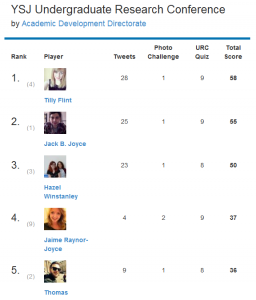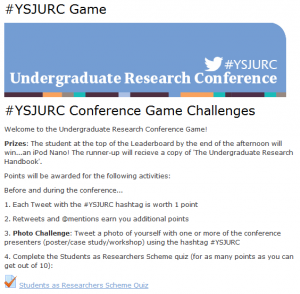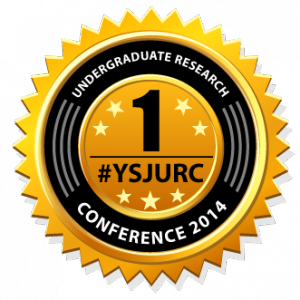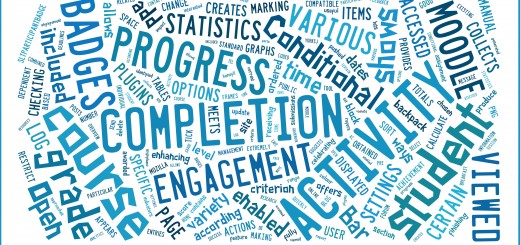How #YSJURC Was Won
The student-led Undergraduate Research Conference took place on Wednesday 22 October 10-4pm in De Grey Court, and celebrated a variety of undergraduate research which has recently taken place at York St John University.
This year, in order to add an extra element of fun, encourage interaction amongst delegates, and to stimulate engagement with the conference, we decided to ‘gamify‘ the event. The leaderboard tracked delegates engagement with a series of challenges based around the use of Twitter and an online Student Researcher Scheme quiz.
We used a platform called Leaderboarded (now called Rise), which I had used previously, as a delegate/player, at the MaharaUK conference (Mahara UK Conference 2014 Game Case Study), and was recommended to me by @KatiePiatt, a colleague at Uni of Brighton. Leaderboarded was easy to setup, easy to use, cheap (£19.99 for a month), and the support from the team at Leaderboarded in setting things up was great.
In total we had 26 players in the game, contributing 183 Tweets, 67 Retweets and 114 @Mentions. There were also 9 (valid) contributions to the photo challenges, and 5 people took the Student Researcher Scheme Quiz.
We took on board feedback from the MaharaUK conference case study, which identified some key lessons learned:
- Integrate the game closely into the conference agenda and events to achieve increased participation rates.
- Retain the motivation of participants and eliminate unwanted gaming behaviours by modifying the scoring metrics as the game progresses.
- Ensure the rules and scores are transparent and regularly reiterated to participants.
- Manage the timing of game updates and activities to create anticipation, and to allow participants to concentrate on the content of the conference during presentations and break out sessions.
Gamification Challenges
Players primarily earned points by Tweeting, being Retweeted, and receiving replies to their Tweets using the conference hashtag #YSJURC. During the conference I had to modify the scoring metrics for Retweets & @Mentions in order to eliminate some unwanted gaming behaviours among delegates.
In addition to the Tweets, there was a photo challenge, in order to stimulate engagement with the poster presentations and workshop presenters, and there was also a quiz about the Students as Researchers Scheme. Photo challenges & quiz scores were weighted more heavily than the Twitter metrics in order to place more emphasis on them.
I decided to award additional points to a couple of participants for their creative photo challenge contributions, but as these scores were collated manually I wanted to keep that to a minimum.
The quiz was created and hosted in Moodle, so students could click through and self-enrol onto the course in order to complete the quiz. Scores were then manually added into Leaderboarded at regular intervals.
Leaderboarded automatically calculates the points and leaderboard positions based on selected weightings for each criteria. Twitter scores can be polled on demand and challenge/quiz scores are manually added. Updates to the leaderboard were released at breaks in the conference which provided anticipation and removed any possible distractions during the presentations.
Engagement
Engagement at the event was modest, but still enough to make it worthwhile. Since the event I have questioned whether students were used to using Twitter in this kind of professional/conference capacity!?
Here are some examples of the Tweets we received:
Much of the pre-conference promotion & communication came from @YSJADD, @YSJTEL & @YSJJobsCareers, so those players were ‘excluded’ from the leaderboard once the conference began (along with any other member of staff associated with the conference):
YSJ Undergraduate Research Conference Leaderboard at https://t.co/oA33VQUYfd – enjoy it while you can staff, you’ll be excluded soon #YSJURC
— Phil Vincent (@PhilVincent) October 20, 2014
Just 24 hours until the fun begins! #YSJURC Hope everyone is looking forward to the @YSJADD 2014 conference! @YSJTEL @YorkStJohn
— Academic Development (@YSJADD) October 21, 2014
Once the conference began, and the game was introduced, students/presenters started Tweeting:
Presenting at the YSJ undergraduate conference today! #YSJURC
— Thomas (@Thomas29Jackson) October 22, 2014
Research buddiesssss #ysjurc game pic.twitter.com/pJjezOh9dw
— Blanca (@Mayoabril12) October 22, 2014
Excited to present at YSJ undergraduate conference #YSJURC
— Natasha Hastings (@lpTasha) October 22, 2014
Team research ! #YSJURC pic.twitter.com/dIPOg7SEAx
— Thomas (@Thomas29Jackson) October 22, 2014
Looking forward to the preparation on young person to adult domestic abuse project #ysjurc
— helen perry (@helenperry81) October 22, 2014
Once the game was in full swing people started talking about it on Twitter:
Can’t believe I am sliding down the leaderboard even after I did the quiz! Gonna have to get a load of photos at the break #YSJURC
— Hazel Winstanley (@HazelnutinYork) October 22, 2014
One or two needed reminding of the rules, but the ‘small print’ allowed me to adjust the metrics to counter the ‘boosting‘:
Keeping my eye on some of these ‘players’ 🙂 “@Jack15194: #YSJURC pic.twitter.com/jJQuWLefDd”
— Phil Vincent (@PhilVincent) October 22, 2014
Some of the more creative selfies earned extra points:
Really enjoyed the presentation/ research project as a while! Great event! Thank you to everyone involved! #YSJURC pic.twitter.com/6z1RTtzNLE
— Jaime Raynor-Joyce (@JaimeRaynor) October 22, 2014
There were plenty of other photos being Tweeted as well:
Some really interesting and diverse case studies being present at undergrad conference today! #YSJURC pic.twitter.com/z0a1WS4z5M
— Thomas (@Thomas29Jackson) October 22, 2014
@til_dawn8 #selfie #YSJURC pic.twitter.com/EeW3EOZcOy
— Hazel Winstanley (@HazelnutinYork) October 22, 2014
As we got nearer the end the competition was heating up:
“@HazelnutinYork: #YSJURC it’s getting very competitive now!” Game on!
— Tilly Flint (@til_dawn8) October 22, 2014
Until we had our (very modest) winner:
When did this happen? #YSJURC pic.twitter.com/lwtB9gsoQ4
— Tilly Flint (@til_dawn8) October 22, 2014
Congratulations @til_dawn8 🙂
Open Badges
The winner of the Undergraduate Research Conference game was also issued with an Open Badge as a token of their victory!
Open Badges are a new online standard for recognising and verifying learning. Individuals can earn badges for the things they learn, both online and offline, and then display them in their Backpack, or on their website or social media profiles. With Open Badges, every badge is full of information. Each one has important data built in that links back to the issuer, the criteria it was issued under and evidence verifying the credential.
Leaderboarded has teamed up with Credly to enable game managers to issue Open Badges to players very easily. It’s a neat solution which you can see in action in this YouTube video ‘How to issue Open Badges with Leaderboarded and Credly‘.
Talking About Teaching 2015
After successfully piloting this gamification approach with the Undergraduate Research Conference 2014, we are already looking forward to adopting the same approach at the Talking About Teaching 2015 conference in January.
I think there is a lot of potential for using this approach in teaching & learning using Twitter. Tutors using Twitter with their students could create leaderboards and reward the most engaged & influential Tweeters with Open Badges as prizes for example. I’d be interested to hear from anyone who has other ideas, or who would like to try this with their students!
Phil





